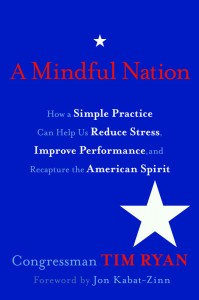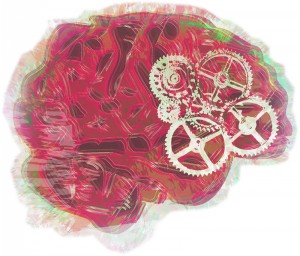
Mindfulness: Newman University, Wichita on leading edge of national project
Did you hear the one about the woman who was so sleep- deprived and late picking up her daughter that she nicked the rear end of her supervisor’s car backing up in the parking lot and decided to leave anyway because she had to get her daughter to that volunteer thing so maybe she could get a service scholarship to college because she certainly wasn’t going to get one on her grades and on the way home she needed to pick up milk for tomorrow and frozen pizza for tonight when she noticed she was in a school zone going close to 50 so she had to slow down which would make her more late and she had her cross-training class tonight which she really wanted because she’d put on a few pounds lately which made her think maybe that’s why the boss passed me over for a promotion and that made her think OH MY GOD I HIT DAVID’S CAR! should I tell him and what will this do to my insurance and my husband will gripe at me which reminded her to tell him – again – that he messed up syncing her iPhone with the audio-navigation- Bluetooth thing in her car when she saw on the map that she’d driven two blocks past the school and had to circle back and then it hit her that she had forgotten to pack her exercise clothes the night before because she was up studying for a test in her Finance class that she had to pass so she could get out of her crappy job and maybe manage a bookstore or that cute little boutique with the hand-made jewelry and dresses and coffee bar like she’d always wanted so she could finally be HAPPY!?!?
No, it’s not a joke.
 For many people, this is what comes from living in today’s multi-tasking, over-scheduled and ultra-competitive world. Poor sleeping habits. Distracted thinking. Impulsive behavior and emotional decision- making. Negative self-image.
For many people, this is what comes from living in today’s multi-tasking, over-scheduled and ultra-competitive world. Poor sleeping habits. Distracted thinking. Impulsive behavior and emotional decision- making. Negative self-image.
In our quest for professional, financial and emotional stability, it’s all too easy to fall into patterns of thinking and behavior that, ironically, keep us from the happiness and peace of mind we seek.
Yet there is another way, according to individuals and organizations that practice and promote a concept called mindfulness.
By learning new skills and training the mind to make new pathways, mindfulness can help people escape the cycle of distractions, anxiety and stress, proponents say. In recent years, the concept has quickly gained the attention and respect of people from all walks of life, who are creating a “quiet revolution” that could change the world.
It’s already changing Wichita, thanks to several members of the Newman University faculty.
“We’re involved in an unprecedented and innovative approach to establish this nation as a ‘Mindful Nation,’” said Associate Professor of Social Work Michael Duxler, Ph.D. “The philosophy is, you start to build a ‘Mindful Nation’ by first building a ‘Mindful City.’ That’s what’s happening now in Wichita.”
Moment by moment
At its essence, Duxler said, mindfulness is the intention to be consciously aware, moment by moment, of our thoughts, feelings, bodily sensations, and surrounding environment. Duxler, along with Professor of Communication Audrey Hane, Ph.D., have noted in several recent presentations that mindfulness involves training the mind to focus on the present and respond with reason before emotion; to accept things as they are rather than making ourselves crazy by wishing things were different.
Studies have shown that mindful living can produce many physical and cognitive benefits, including improved eating and sleeping habits, pain management and stress reduction, better health, more clarity, creativity and emotional resilience, and relational benefits such as increased empathy, kindness, impulse control and responsible communication.
In their presentations, Duxler and Hane try to show these benefits to attendees, and give them a better understanding of mindfulness. “They may be hearing about it in the news, it’s on the cover of Time Magazine, you open Parade Magazine and there are articles about mindfulness, so it’s pretty much everywhere,” Hane said. “[Our goal is] really clarifying what mindfulness is, and then giving them the opportunity to experience some mindful practices so they understand how they might be able to integrate it into their own lives.”
The interest in mindfulness, mindful living and mindful practice began in large part with a 2010 book written by U.S. Rep. Tim Ryan called, A Mindful
Nation: How a Simple Practice Can Help Us Reduce Stress, Improve Performance, and Recapture the American Spirit.
The book inspired the formation of several groups, including the Mindful Nation Foundation and the local Wichita in Mind, which Duxler played a central role in creating, to increase awareness and practice of mindful living.
Duxler said the MNF recently decided to choose a city that could be developed into a Mindful City, that would demonstrate that a Mindful Nation can become a reality.
The city they chose was Wichita.
Duxler said Wichita was selected for its central geographic location, its local social and educational institutions that are amenable to developing a mindful culture, and
a pre-established partnership among Newman University, Friends University and Wichita State University, which was formed several years ago by members of each institution to explore mindful practices.
“I had already been working with Discovery Place and Early Head Start on helping to train teachers,” Duxler said, “and with faculty members at other universities on various community projects. When the opportunity was presented to Wichita to be the host city for this endeavor, it was easy to incorporate things we were already doing.”
A 100-year plan
The plan for Wichita includes focusing on specific local groups to show how mindfulness principles and practices can be helpful. The groups include veterans and first responders, teachers and students (pre-school to K–12), healthcare professionals, and community leaders. In collaboration with the MNF, WIM is focusing on veterans and teachers. Duxler said several training sessions and mindful practice groups have already been launched. Faculty members from Friends and WSU are taking the lead with veterans. Duxler and Hane, along with Newman Director of Graduate Education Gina Marx, Ed.D., and Associate Dean of Education Steve Dunn, Ed.D., are leading the work with teachers.
Hane noted that giving teachers the tools for mindful practice can create a more stable classroom environment for students, who will then pick up the practices themselves.
“We’ve been working with teachers from USD 259, the Catholic schools, Early Head Start, and training them as well,” Duxler added. “Then, with Head Start and Discovery Place, we’ve implemented some of these things with the kids.”
Through the MNF, Duxler and his colleagues were also introduced
to Mind Body Medicine, a system developed by Dr. Jim Gordon based on mindfulness principles. Duxler said Gordon developed an effective curriculum for helping veterans and veterans’ families, which local mindfulness proponents are learning.
“What we’re hoping is Newman can infuse that curriculum – be the first university in the country to actually infuse it – into the undergraduate and then the graduate Education Department,” Duxler said.
Duxler noted that turning Wichita into a Mindful City and the United States into a Mindful Nation will take time.
“We have put more emphasis on being a learning community than on any specific timetable,” he said. “In the era of quick fixes and Band-Aid solutions, ours is a 100-year plan. We want to lay the foundation for future generations to take up. Therefore, we put less emphasis on timetables, and more on getting this right.”
To see a video of Duxler discussing mindfulness, visit go.newmanu.edu/DuxlerMindfulness.
To read more on the topic and see videos of Duxler and Hane, visit go.newmanu.edu/Mindfulness. To learn more about the Mindful Nation Foundation, visit mindfulnationnetwork.com. To learn more about Wichita in Mind, visit wichita.mindfulnationnetwork.com.

